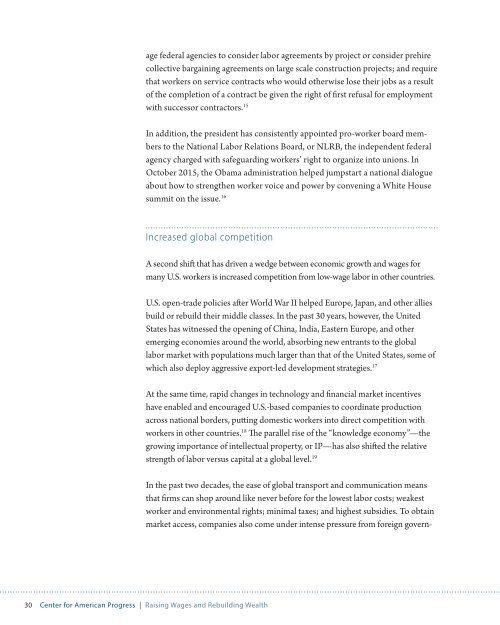AGENCY/PHOTOGRAPHER
RaisingWagesRebuildingWealth
RaisingWagesRebuildingWealth
Create successful ePaper yourself
Turn your PDF publications into a flip-book with our unique Google optimized e-Paper software.
age federal agencies to consider labor agreements by project or consider prehire<br />
collective bargaining agreements on large scale construction projects; and require<br />
that workers on service contracts who would otherwise lose their jobs as a result<br />
of the completion of a contract be given the right of first refusal for employment<br />
with successor contractors. 15<br />
In addition, the president has consistently appointed pro-worker board members<br />
to the National Labor Relations Board, or NLRB, the independent federal<br />
agency charged with safeguarding workers’ right to organize into unions. In<br />
October 2015, the Obama administration helped jumpstart a national dialogue<br />
about how to strengthen worker voice and power by convening a White House<br />
summit on the issue. 16<br />
Increased global competition<br />
A second shift that has driven a wedge between economic growth and wages for<br />
many U.S. workers is increased competition from low-wage labor in other countries.<br />
U.S. open-trade policies after World War II helped Europe, Japan, and other allies<br />
build or rebuild their middle classes. In the past 30 years, however, the United<br />
States has witnessed the opening of China, India, Eastern Europe, and other<br />
emerging economies around the world, absorbing new entrants to the global<br />
labor market with populations much larger than that of the United States, some of<br />
which also deploy aggressive export-led development strategies. 17<br />
At the same time, rapid changes in technology and financial market incentives<br />
have enabled and encouraged U.S.-based companies to coordinate production<br />
across national borders, putting domestic workers into direct competition with<br />
workers in other countries. 18 The parallel rise of the “knowledge economy”—the<br />
growing importance of intellectual property, or IP—has also shifted the relative<br />
strength of labor versus capital at a global level. 19<br />
In the past two decades, the ease of global transport and communication means<br />
that firms can shop around like never before for the lowest labor costs; weakest<br />
worker and environmental rights; minimal taxes; and highest subsidies. To obtain<br />
market access, companies also come under intense pressure from foreign govern-<br />
30 Center for American Progress | Raising Wages and Rebuilding Wealth


